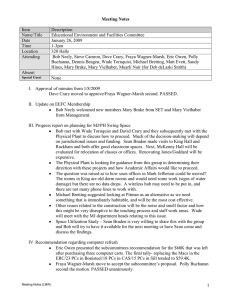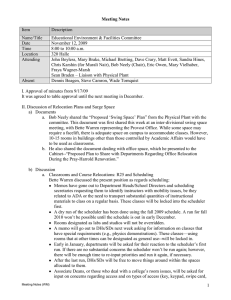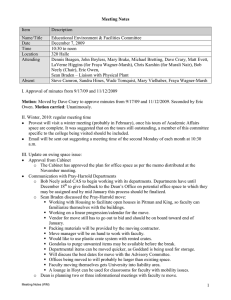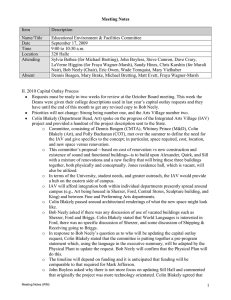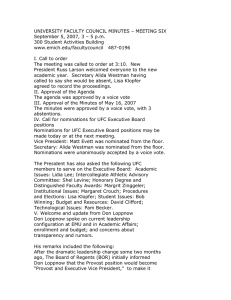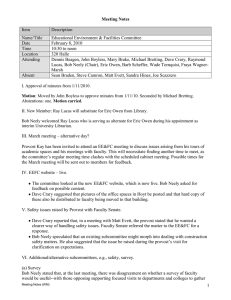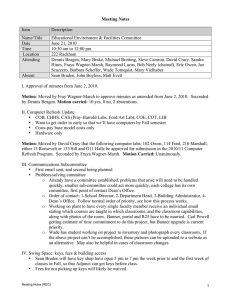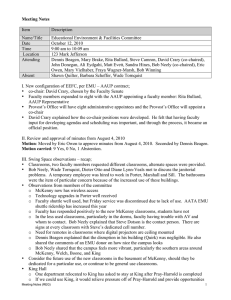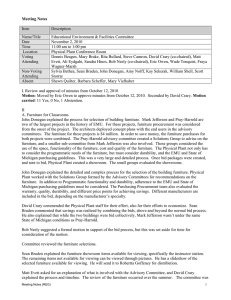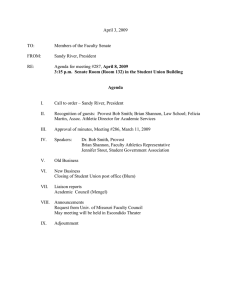Item Description Name/Title
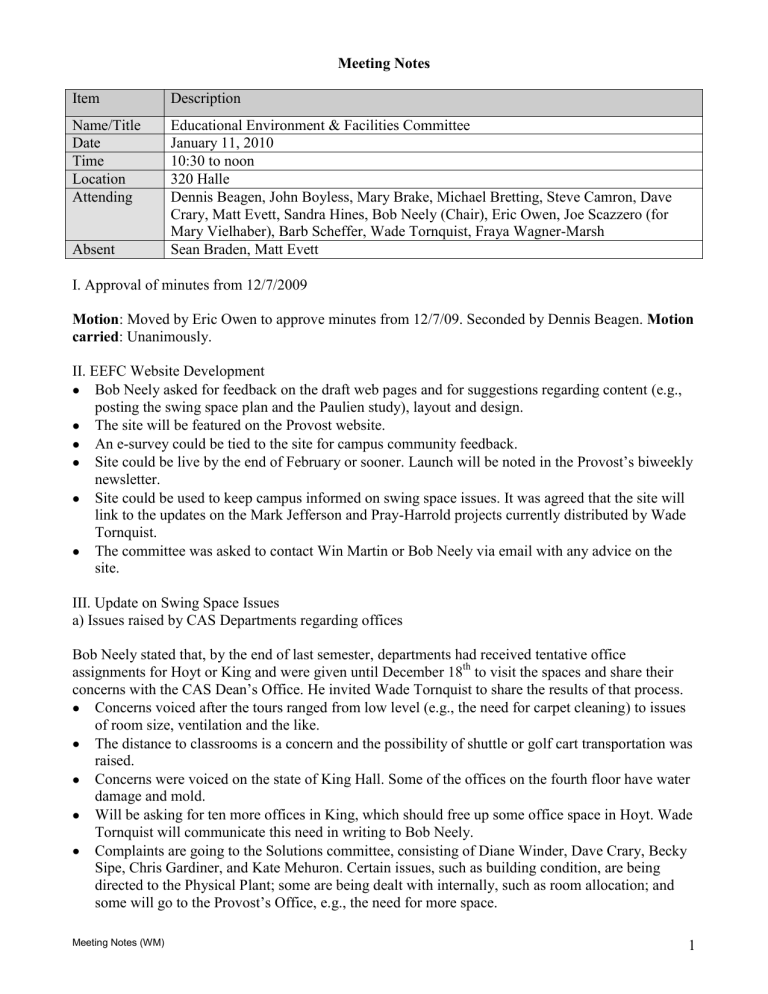
Meeting Notes
Item Description
Name/Title Educational Environment & Facilities Committee
Date
Time
January 11, 2010
10:30 to noon
Location
Attending
320 Halle
Dennis Beagen, John Boyless, Mary Brake, Michael Bretting, Steve Camron, Dave
Crary, Matt Evett, Sandra Hines, Bob Neely (Chair), Eric Owen, Joe Scazzero (for
Mary Vielhaber), Barb Scheffer, Wade Tornquist, Fraya Wagner-Marsh
Sean Braden, Matt Evett Absent
I. Approval of minutes from 12/7/2009
Motion : Moved by Eric Owen to approve minutes from 12/7/09. Seconded by Dennis Beagen. Motion carried : Unanimously.
II. EEFC Website Development
Bob Neely asked for feedback on the draft web pages and for suggestions regarding content (e.g., posting the swing space plan and the Paulien study), layout and design.
The site will be featured on the Provost website.
An e-survey could be tied to the site for campus community feedback.
Site could be live by the end of February or sooner. Launch will be noted in the Provost’s biweekly newsletter.
Site could be used to keep campus informed on swing space issues. It was agreed that the site will link to the updates on the Mark Jefferson and Pray-Harrold projects currently distributed by Wade
Tornquist.
The committee was asked to contact Win Martin or Bob Neely via email with any advice on the site.
III. Update on Swing Space Issues a) Issues raised by CAS Departments regarding offices
Bob Neely stated that, by the end of last semester, departments had received tentative office assignments for Hoyt or King and were given until December 18 th
to visit the spaces and share their concerns with the CAS Dean’s Office. He invited Wade Tornquist to share the results of that process.
Concerns voiced after the tours ranged from low level (e.g., the need for carpet cleaning) to issues of room size, ventilation and the like.
The distance to classrooms is a concern and the possibility of shuttle or golf cart transportation was raised.
Concerns were voiced on the state of King Hall. Some of the offices on the fourth floor have water damage and mold.
Will be asking for ten more offices in King, which should free up some office space in Hoyt. Wade
Tornquist will communicate this need in writing to Bob Neely.
Complaints are going to the Solutions committee, consisting of Diane Winder, Dave Crary, Becky
Sipe, Chris Gardiner, and Kate Mehuron. Certain issues, such as building condition, are being directed to the Physical Plant; some are being dealt with internally, such as room allocation; and some will go to the Provost’s Office, e.g., the need for more space.
Meeting Notes (WM) 1
Dennis Beagen stated that the Physical Plant will need to decide on certain issues—such as the subdivision of larger spaces—before the Departments can make decisions on room allocation.
Dave Crary stated that there needs to be better communication between the Solutions Committee and other committees dealing with the Pray-Harrold move.
Bob Neely stated that, in the short term, there is plenty of room in King; however, in the long term—when the Psychology Department is factored in—there may be a scramble to find space in that building. Options include asking Art to relinquish the space it uses in the basement and requesting DECA to pull back in the space it uses. For now, DECA will continue to use its present space.
Regarding WEMU on the fourth floor of King, Walter Kraft will be asking them to retrench back into the space they were originally allocated (approximately one quarter of that floor), which will allow room for SAC.
In response to the question if there is a long term plan for the space being utilized as swing space after people move back to their original units, Dave Crary noted that last winter the committee passed a resolution asking that King be explored as long term space for faculty offices. Bob Neely stated that, while Academic Affairs can decide if departments go into King, the committee should be cognizant of the fact that the facility may not live up to people’s expectations.
Dave Crary asked if adequate money is allocated to bring the swing space offices up to acceptable levels. Bob Neely replied that these funds would have to come out of the project money and he undertook to discuss the situation with Sean Braden of the Physical Plant.
Motion : Moved by Dave Crary to encourage the Cabinet to take action to ensure that adequate funds are available to bring any space allocated to the moves from Mark Jefferson and Pray-Harrold up to adequate standards in a timely fashion based on cost estimates to be provided by the Physical Plant.
Seconded by Wade Tornquist. Motion carried : Unanimously. b) Timeline for Next Steps
Wade Tornquist stated that CAS will be asking its departments for commitments to specific office space this month. There has been no rejection of allocated spaces, just requests for slight improvements. While departments are free to trade spaces internally, they must state which faculty will be located in which spaces.
Women’s & Gender Studies will be located in King, not Hoyt as originally planned.
Dennis Beagen raised the question of power capacity in Hoyt being inadequate for office needs
(computers, etc.).
As regards computer drops, Wade Tornquist stated that IT has given permission to temporarily wave their rule on one computer per drop to facilitate the moves.
Regarding department computer labs (e.g., in Economics and Computer Science departments): o Hoyt and King cannot facilitate these labs. o The plan is to take the licensed specialized software in department labs and put it on certain computers in the open labs in Halle. While these computers may still be open to all students, the students requiring that software would have preference for use of those machines. o In Computer Science, the GA manning the open lab could be relocated to provide that service for CS students using the Halle open lab. o Bob Neely pointed out that there is the issue of competition between IT and CAS for resources in Halle. If CAS doesn’t get adequate resources in the library, freed up lab space in the Coatings Institute might be a solution.
Meeting Notes (WM) 2
With regard to computer carts: o Biology and CMTA each have a cart. o The cart now available for use in Pray-Harrold will be available for general use—not just for CAS.
As regards classroom allocations: o Bob Neely stated that the adequacy of classroom space is a prime concern with the
Provost’s Office. o Wade Tornquist stated that department heads have sent schedules for spring, summer, and fall to Bette Warren, together with recommendations for the spaces that would work for them. Additionally, she is considering four categories of special requests:
ADA based requests
Requests based on large amounts of instructional materials to be transported to class.
Classes requiring computers.
Classes requiring special equipment other than computers (e.g., certain physics courses.
As of now, only the ADA based requests have been input into R25. o As the schedule is currently input into R25, there is enough classroom capacity for fall
2010 on campus.
Running R25 on enrollment--rather than capacity--will increase choice of space where large sections can be accommodated in smaller rooms than anticipated.
Bob Neely stated that, while all classes can be accommodated, the desired outcome is to locate people where they want to teach.
Rooms in the Student Center and McKenny are being held back in the scheduling model, for use only as a last resort. This allows some contingency space to accommodate the needs of a specific pedagogy.
Classes requiring computer labs—where R25 is not yet aware of the need--are of concern and need to be locked into the model.
Classroom configurations—e.g., seating arrangement—need to be considered.
Bette Warren hopes to have the first pass of tentative classroom assignments to department heads in the next couple of weeks.
Chris Shell wants to include room assignments in fall schedules, which entails a deadline of March 8th.
Classroom requests should be based on the typical enrollment of that class over the last few years, not on capacity or room preference. Bob Neely mentioned that the Provost is asking Bette Warren to do a historical analysis based on past enrollment.
Asking faculty to teach in off campus locations (e.g., EMU Livonia facilities) raises the question of whether students would attend such classes and the possible requirement of an MOU with the AAUP.
COB hasn’t been incorporated into the plan due to distance and different time schedule used in that college.
Barb Scheffer stated that while certain CHHS classes--given the prescriptive nature of the programs involved--require certain classrooms, that college would be willing to release open classrooms. If any CHHS classes are relocated out of the building to non smart classrooms, faculty would need to be aware of that in advance.
Sandra Hines suggested that a schedule be posted for each classroom, showing the day’s use, so that instructors know if they can meet with students before and/or after class.
Meeting Notes (WM) 3
o With regard to technology in the classroom:
Wade Tornquist undertook to send the Associate Deans a list of technology available in the classrooms in their colleges for their verification.
Increased use of technology in certain rooms will entail the need for training on use of the equipment and funds to cover wear and tear (to be provided by the
Provost’s Office). Also, security issues may involve hiring people to open and close these rooms, rather than handing out keys.
CAS is holding open forums monthly (10:00-11:30 a.m. on January 22 nd
19 th
, February 19 th
, March
, and April 16 th
) which will include an overview of the projects, answering FAQs, information on move management, and updates on transportation to/from classrooms.
IV. Computer Refresh: Laptops
Bob Neely referred to the email from Morrell Boone indicating that the computer lab in room 16
Roosevelt has six year old computers which have been failing on a weekly basis and requesting that this lab be moved up on the refresh list. The developmental math lab is next on the list, but given that
Math will be moving out of Pray-Harrold shortly and that laptops would meet the needs of this unit, moving COT up on the list might be a sensible course of action. If the money were redirected to COT, the laptop solution for developmental math should not be difficult to resolve. John Boyless related student complaints regarding the COT lab and mentioned that high-end computers are required as they are used for forensic courses. The estimated cost of replacement is $36,000. He stated that the $25K remaining in lab refresh would be sufficient help for the COT lab.
Motion : Moved by Dennis Beagen that the $25K remaining in the computer refresh fund be used toward the Roosevelt lab. Seconded by Sandra Hines. Motion carried : Unanimously.
V. EEFC Function: Proactive Efforts?
Bob Neely raised the issue of a faculty/staff survey, tied to specific buildings, for use by the committee in prioritization of need and advocacy of projects with the Physical Plant. He asked for feedback on this idea and for other suggests as to how this committee can increase its effectiveness.
Dave Crary voiced reservation on the survey idea in that almost half of the faculty will be in flux with the Mark Jefferson and Pray-Harrold projects. He suggested that the Associate Deans have a good idea of the specific problems related to facilities in their colleges and that the committee pick up on the problems identified in the Paulien study.
Dennis Beagen stated that a lot of the negativity directed toward the committee relates to technological needs in the Arts not being addressed on campus. Faculty often don’t understand the challenges these needs raise; for example, the time necessary to move on a major project like an integrated arts facility.
A survey raises the risk of increased expectations as regards action by the committee and, in reality, the committee’s actions are limited to passing resolutions. Apart from computer lab refresh, the committee does not have funds to spend. It could pass a resolution to be provided with resources to address needs effectively.
Joe Scazzero raised the issue of survey validity. If, rather than using a survey, faculty were asked for input by their department heads, there would be greater likelihood of identification of real needs and of representation of the views of all faculty.
It was suggested that members of the committee could visit departmental faculty meetings, which would convey the committee’s responsiveness to faculty needs and increase committee credibility.
Bob Neely undertook to bring a list of relevant departments/schools and buildings to the next committee meeting so assignments could be made as to which committee members would make
Meeting Notes (WM) 4
these visits. He also undertook to communicate with department heads prior to such visits to ensure the faculty are prepared.
Barb Scheffer suggested that the committee seek to operationalize the three items outlined in the committee’s statement of purpose so as to give direction to committee members as to how to meet these charges.
Bob Neely mentioned that there is a lot of disagreement on campus as to the role of the committee.
While the MOU establishing the committee states its role regarding facilities, certain bodies regard its role as relating to minor issue, such as room temperature. If a committee is going to exist it needs to be active and accomplish its goals, and it should move forward accordingly.
VI. Other Items
There was discussion of the increased responsiveness of the Physical Plant in terms of its interest in using the committee for input in allocating resources in academic buildings and in providing information to the committee.
It was suggested that the committee prepare to meet with the new Chief Information Officer.
The Provost will meet with the committee in February or March, once his tours of campus are complete.
Meeting Notes (WM) 5
